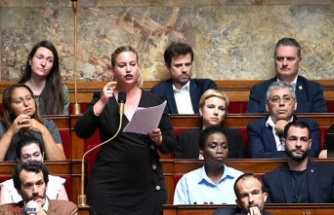Inheritance tax can also hit middle-class families - especially when real estate is inherited. This can be avoided with timely donations. But they should be well planned.
The inherited parental home can become a financial burden if high inheritance tax is associated with it. "Due to the rapid increase in real estate prices in the last decade, the value of houses has risen enormously, especially in metropolitan areas," says Sophie Mecchia, legal expert at Stiftung Warentest. "The allowances are often no longer sufficient." In addition, since this year there have been changes in the valuation methods for real estate, which can lead to a higher tax burden.
One way out: timely donations. But what do you have to pay attention to here? And when is a good time to do this?
In Germany, large sums of money are inherited every year: 400 billion euros, according to estimates by the German Institute for Economic Research (DIW). While many households inherit nothing or only a little, every fifth inheritance is between 250,000 euros and one million euros. That's what researchers at the German Institute for Old-Age Provision calculated.
Inheritance tax is an issue, especially in the case of large fortunes for which there are only a few heirs. Because then the actually generous allowances for heirs are exceeded. These allowances work like this: "The closer the relationship, the higher the sums that remain tax-free," explains Mecchia.
Spouses and life partners, for example, have an allowance of 500,000 euros, and children can inherit up to 400,000 euros tax-free. Siblings or unmarried partners, on the other hand, have to pay tax on inheritances that exceed 20,000 euros. Because the values have not been adjusted for several years, Federal Finance Minister Christian Lindner from the FDP considers an increase in values by 25 percent to be appropriate. However, he sees the Federal Council on the train, because the inheritance tax flows completely to the states. "Anyone who wants to prevent their heirs from having to pay taxes on their parents' home or assets should start doing the math," recommends Mecchia. "The more heirs there are, the more can be distributed tax-free."
The first step is therefore an overview of the assets. How much money should be distributed, how much is the property worth? And who should inherit everything? The corresponding allowances are then offset against this.
An example: A widow owns an apartment in Munich that is now worth 600,000 euros. She only has one son. If he inherits, his allowance of 400,000 euros is not enough. He would have to pay inheritance tax on the remaining 200,000 euros. How high this is, in turn, is measured according to the degree of relationship and the amount of assets. If, on the other hand, the widow had two children, the combined allowances would be sufficient to hand over the apartment tax-free.
If the calculation doesn't add up, a gift could be a way to avoid inheritance tax. "The same allowances apply as for inheritance, but they are repeated every ten years," says Mecchia. This can be exploited with a little lead time.
The widow in our example could, for example, give her son half of the apartment tax-free. The 300,000 euros are below his allowance. If she then dies, he inherits the other half tax-free as well.
If the widow still has assets in her account in addition to her apartment, she could give away a part again after ten years in order to take advantage of the allowances. Testators have a free hand here. Very large assets can be passed on through donations not only to spouses and children, but also to grandchildren, for example. In the case of real estate, however, it makes sense to avoid such communities of heirs, says legal expert Mecchia.
Martin Thelen, press spokesman for the Federal Chamber of Notaries, advises anyone who gives away their assets to save on taxes, should start early. "Many arrive too late. Then the probability that it will work decreases." Because the ten-year period is important. If the deceased dies before the end of this period, the donation will be counted towards the inheritance - and everything was in vain.
If you part with your assets before the end of your life, you should also note: a gift is a gift. "So testators should be sure that they no longer need this part of their assets. Or secure the donation accordingly," advises Thelen.
In the case of real estate, for example, it makes sense to secure a right of residence. If an apartment is rented, a usufruct right ensures that the rental income continues to belong to the donor, even though the apartment already belongs in whole or in part to the heirs.
You can also set a right to a refund. "It can also be subject to conditions," says Thelen. "For example, if the recipient becomes insolvent, such a right prevents the property from becoming part of the insolvency estate."
If you give away your little house, you have to go to a notary who will also advise you on the consequences. In theory, a simple transfer is sufficient for monetary amounts. But even then it makes sense to draw up a contract, Thelen recommends. On the one hand, it serves as proof for the tax office - because every donation has to be reported there.
If there are several heirs, it makes sense to settle the entire estate at the same time. If only one child receives a gift, their siblings may be entitled to compensation payments in the event of inheritance. "A will should then be adjusted accordingly",












